The Hereditary Amyloidosis Treatment Market is estimated to be valued at USD 11.6 billion in 2025 and is projected to reach USD 48.2 billion by 2035, registering a compound annual growth rate (CAGR) of 15.3% over the forecast period.
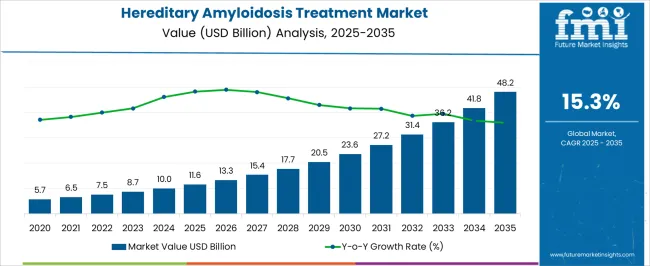
| Metric | Value |
|---|---|
| Hereditary Amyloidosis Treatment Market Estimated Value in (2025 E) | USD 11.6 billion |
| Hereditary Amyloidosis Treatment Market Forecast Value in (2035 F) | USD 48.2 billion |
| Forecast CAGR (2025 to 2035) | 15.3% |
The Hereditary Amyloidosis Treatment market is experiencing steady growth driven by the increasing prevalence of genetic amyloid disorders and the expanding adoption of targeted therapies. The current market is shaped by advances in treatment modalities that focus on halting the progression of amyloid deposition and improving patient outcomes. Growing awareness among clinicians and patients about hereditary forms of amyloidosis has accelerated early diagnosis and intervention, which is critical for effective management of the disease.
Investment in research and development of gene-silencing therapies and source treatment options is supporting the expansion of the market. Healthcare infrastructure improvements and the growing presence of specialized treatment centers are further facilitating access to therapy, particularly in regions with higher disease prevalence.
The market outlook is also influenced by the rising number of clinical trials exploring innovative treatment approaches, which is expected to introduce novel therapies into the pipeline As the global healthcare landscape increasingly prioritizes personalized and precision medicine, the Hereditary Amyloidosis Treatment market is well-positioned to maintain sustained growth and adoption across diverse patient populations.
The hereditary amyloidosis treatment market is segmented by disease type, treatment type, end user, and geographic regions. By disease type, hereditary amyloidosis treatment market is divided into ATTR amyloidosis and Non-TTR amyloidosis. In terms of treatment type, hereditary amyloidosis treatment market is classified into Source treatment and Supportive treatment. Based on end user, hereditary amyloidosis treatment market is segmented into Hospitals, Specialty Clinics, and Inpatient Pharmacies. Regionally, the hereditary amyloidosis treatment industry is classified into North America, Latin America, Western Europe, Eastern Europe, Balkan & Baltic Countries, Russia & Belarus, Central Asia, East Asia, South Asia & Pacific, and the Middle East & Africa.
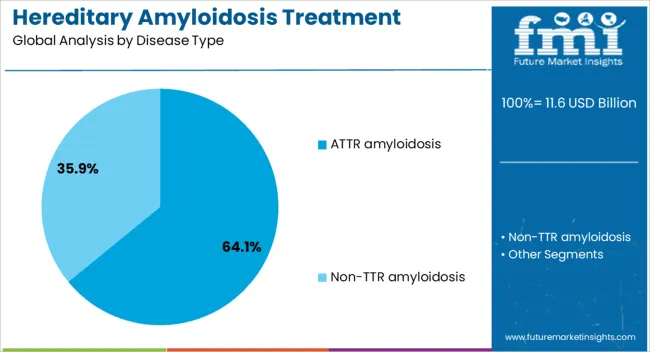
The ATTR amyloidosis disease type is projected to hold 64.10% of the market revenue share in 2025, making it the leading disease segment. This predominance is being driven by its high prevalence among hereditary amyloidosis patients and the significant clinical focus on managing its progression through targeted interventions. Adoption has been accelerated by the availability of therapies that specifically address transthyretin protein misfolding, offering substantial improvement in patient prognosis.
The growth of this segment has also been facilitated by enhanced genetic screening programs, which allow early identification of high-risk individuals and timely therapeutic intervention. Additionally, clinicians are increasingly favoring disease-modifying treatments due to their ability to reduce systemic amyloid deposition and slow organ damage.
The segment is further supported by ongoing research into long-term outcomes and safety profiles of new therapeutic options, which continues to build clinical confidence The ATTR amyloidosis segment is expected to remain the primary focus of treatment development, sustaining its leading market position through both innovation and clinical adoption.
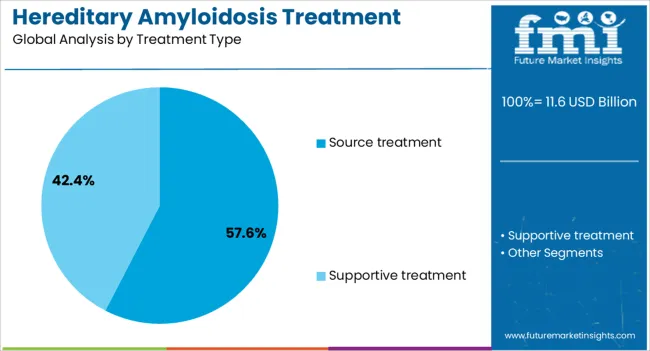
The source treatment type is anticipated to capture 57.60% of the total market revenue in 2025, emerging as the leading treatment modality for hereditary amyloidosis. This dominance is being attributed to its effectiveness in reducing the underlying cause of amyloid protein accumulation, thereby addressing disease progression rather than only symptomatic relief. The growth of this segment has been reinforced by the increasing preference for therapies that offer measurable outcomes in slowing organ impairment and improving survival rates.
Adoption has been further encouraged by the establishment of structured treatment protocols and specialized centers capable of delivering source treatment safely and efficiently. Additionally, patient demand for long-term, disease-modifying therapies has accelerated the uptake of source treatment over conventional interventions.
The segment has also benefited from clinical studies demonstrating the sustained efficacy and safety of these therapies, reinforcing confidence among healthcare providers Moving forward, the source treatment segment is expected to maintain its market leadership as novel formulations and delivery methods enhance accessibility and optimize patient outcomes.
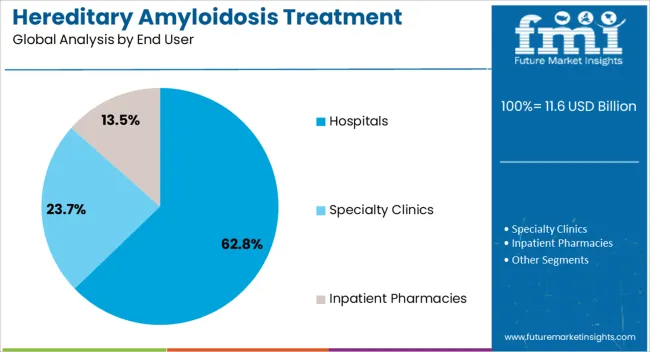
The hospitals end-user segment is expected to hold 62.80% of the market revenue in 2025, making it the largest end-use segment for hereditary amyloidosis treatment. This leadership position is being driven by the critical role hospitals play in providing specialized care, including diagnostic services, advanced therapy administration, and post-treatment monitoring. Hospitals are increasingly equipped with trained specialists, infrastructure for complex treatment delivery, and the ability to manage rare and hereditary conditions, which makes them the preferred venue for source treatment administration.
The segment’s growth has also been influenced by the consolidation of treatment services within hospital networks, allowing for integrated patient management and enhanced clinical outcomes. Additionally, hospitals facilitate early diagnosis through genetic and biomarker testing, supporting timely initiation of therapy, which is essential for slowing disease progression.
With the rising prevalence of hereditary amyloidosis and growing awareness of disease-specific therapies, hospitals are expected to continue dominating as the primary point of care Their capacity to provide comprehensive and multidisciplinary care ensures the sustained growth of this segment in the coming years.
Hereditary Amyloidosis is one of the amyloidosis disease that is caused by inherited genetic mutation. The mutation that produces amyloid protein that forms into an abnormal nature. The defected amyloid protein is deposited in the body's organs and nerves causing a heavy buildup, which may affect and damage organ function or tissue damage. Even if the person is born with the genetic mutation, generally the effects doesn't occur till reaching adulthood. Though all types of the hereditary amyloidosis can cause serious problems. The hereditary amyloidosis is complicated as there are nearly 230 genetic variation in the amyloidosis diseases.
As such no particular treatment is available for particularly hereditary amyloidosis, only the symptoms can be treated. Which generally involves a supportive treatment or source treatment supporting the reduction of symptoms only. Due to the complex nature of the hereditary amyloidosis, incorrect and delayed diagnosis affects the quality of life of patients. Chronic condition of hereditary amyloidosis can lead to disability and mortality.
Although hereditary amyloidosis treatment is mainly utilized to reduce the symptoms related to hereditary amyloidosis, no primary treatment is available to cure the hereditary amyloidosis completely. The unavailability of alternative and parallel therapy option is an indirectly boosting the consumption and demand for existing hereditary amyloidosis treatment.
The rising awareness about the rare disease and increasing attention towards the heredity related disorders in general population is anticipated to create the demand for hereditary amyloidosis treatment, subsequently offering growth opportunity for hereditary amyloidosis treatment market. The lineup for hereditary amyloidosis treatment is very limited. Resulting in rapid uptake of currently available therapies in the market, thereby creating an imbalanced demand and supply scenario for hereditary amyloidosis treatment market.
The increasing investment in Hereditary Amyloidosis Treatment market and increasing reimbursement facility is developed countries such as USA and Germany is anticipated to drive the hereditary amyloidosis treatment market. However, lack of complete recovery associated with Hereditary Amyloidosis Treatment and requirements of diagnosis on frequent basis is anticipate the restraint the growth of the Hereditary Amyloidosis Treatment market.
The manufacturers in the hereditary amyloidosis treatment market are primarily focused on development of new treatment therapies. The global hereditary amyloidosis treatment market is witnessing a solid growth owing to growing awareness among the population for the rare disease treatment and high attention towards presence of family hereditary history. The demand for hereditary amyloidosis treatment is mainly arising from developed countries due to well-developed healthcare infrastructure and high healthcare standards.
The manufacturers in the Hereditary Amyloidosis Treatment is focused on continuous research and development to develop new therapy for the Hereditary Amyloidosis Treatment. The advantage of Hereditary Amyloidosis Treatment in targeted disease application in subtypes of hereditary amyloidosis diseases is anticipated to offer manufactures a niche market to target.
The global Hereditary Amyloidosis Treatment market is segmented into the following regions - North America, Latin America, Western Europe, Eastern Europe, Asia-Pacific Excluding China & Japan, China, Japan and the Middle East & Africa. North America is the dominant regional market for hereditary amyloidosis treatment due to rising awareness for the reimbursement associated with hereditary amyloidosis treatment in the region. In North America, the USA is the dominating market due to high healthcare standards and increasing awareness among the patients and physicians.
Europe Hereditary Amyloidosis Treatment market is anticipated to grow substantially due to rising initiatives by the government to increase the funding for research associated with the rare diseases. China and Japan is a fast-growing market for Hereditary Amyloidosis Treatment due to increasing demand for standard treatments for rare disease involving subsidized medicines. Growth in the Latin America and the Middle East and Africa is growing steadily due to demand for Supportive care in treatment of rare disease.
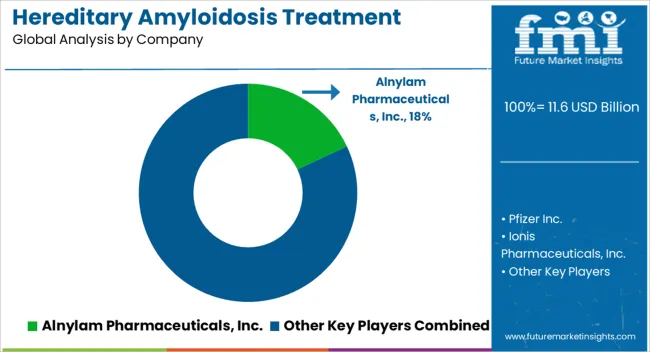
Examples of some of the key participants in the Hereditary Amyloidosis Treatment market are Baxter International, Inc., DePuy Synthes Companies, Alnylam Pharmaceuticals, Inc., Pfizer, Inc., Prothena Corporation Plc, GlaxoSmithKline Plc, Ionis Pharmaceuticals, Inc., Eidos Therapeutics, and SOM Innovation Biotech, S.L Among others.
The research report presents a comprehensive assessment of the market and contains thoughtful insights, facts, historical data, and statistically supported and industry-validated market data. It also includes projections using a suitable set of assumptions and methodologies. The research report provides analysis and information according to market segments such as geographies, application, and industry.
The report is a compilation of first-hand information, qualitative and quantitative assessment by industry analysts, inputs from industry experts and industry participants across the value chain. The report provides an in-depth analysis of parent market trends, macroeconomic indicators and governing factors along with market attractiveness as per segments. The report also maps the qualitative impact of various market factors on market segments and geographies.
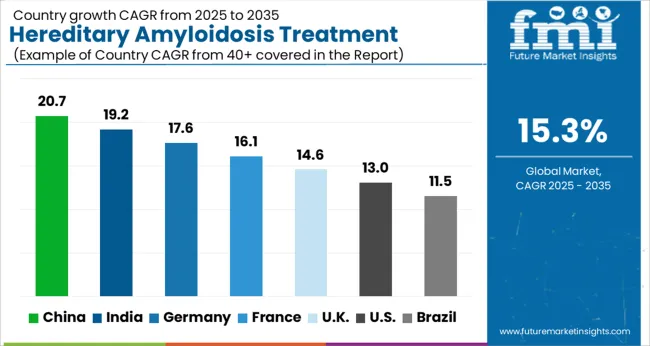
| Country | CAGR |
|---|---|
| China | 20.7% |
| India | 19.2% |
| Germany | 17.6% |
| France | 16.1% |
| UK | 14.6% |
| USA | 13.0% |
| Brazil | 11.5% |
The Hereditary Amyloidosis Treatment Market is expected to register a CAGR of 15.3% during the forecast period, exhibiting varied country level momentum. China leads with the highest CAGR of 20.7%, followed by India at 19.2%. Developed markets such as Germany, France, and the UK continue to expand steadily, while the USA is likely to grow at consistent rates. Brazil posts the lowest CAGR at 11.5%, yet still underscores a broadly positive trajectory for the global Hereditary Amyloidosis Treatment Market. In 2024, Germany held a dominant revenue in the Western Europe market and is expected to grow with a CAGR of 17.6%. The USA Hereditary Amyloidosis Treatment Market is estimated to be valued at USD 4.3 billion in 2025 and is anticipated to reach a valuation of USD 14.7 billion by 2035. Sales are projected to rise at a CAGR of 13.0% over the forecast period between 2025 and 2035. While Japan and South Korea markets are estimated to be valued at USD 544.9 million and USD 307.4 million respectively in 2025.
| Item | Value |
|---|---|
| Quantitative Units | USD 11.6 Billion |
| Disease Type | ATTR amyloidosis and Non-TTR amyloidosis |
| Treatment Type | Source treatment and Supportive treatment |
| End User | Hospitals, Specialty Clinics, and Inpatient Pharmacies |
| Regions Covered | North America, Europe, Asia-Pacific, Latin America, Middle East & Africa |
| Country Covered | United States, Canada, Germany, France, United Kingdom, China, Japan, India, Brazil, South Africa |
| Key Companies Profiled | Alnylam Pharmaceuticals, Inc., Pfizer Inc., Ionis Pharmaceuticals, Inc., Prothena Corporation plc, Akcea Therapeutics, Inc., and Eidos Therapeutics, Inc. |
The global hereditary amyloidosis treatment market is estimated to be valued at USD 11.6 billion in 2025.
The market size for the hereditary amyloidosis treatment market is projected to reach USD 48.2 billion by 2035.
The hereditary amyloidosis treatment market is expected to grow at a 15.3% CAGR between 2025 and 2035.
The key product types in hereditary amyloidosis treatment market are attr amyloidosis and non-ttr amyloidosis.
In terms of treatment type, source treatment segment to command 57.6% share in the hereditary amyloidosis treatment market in 2025.






Full Research Suite comprises of:
Market outlook & trends analysis
Interviews & case studies
Strategic recommendations
Vendor profiles & capabilities analysis
5-year forecasts
8 regions and 60+ country-level data splits
Market segment data splits
12 months of continuous data updates
DELIVERED AS:
PDF EXCEL ONLINE
Hereditary Cancer Testing Market Size and Share Forecast Outlook 2025 to 2035
Amyloidosis Treatment Market Size and Share Forecast Outlook 2025 to 2035
AL Amyloidosis Therapeutics Market Growth and Analysis: 2025 to 2035
Market Share Insights of Transthyretin Amyloidosis Treatment Providers
Treatment-Resistant Hypertension Management Market Size and Share Forecast Outlook 2025 to 2035
Treatment-Resistant Depression Treatment Market Size and Share Forecast Outlook 2025 to 2035
Treatment Pumps Market Insights Growth & Demand Forecast 2025 to 2035
Pretreatment Coatings Market Size and Share Forecast Outlook 2025 to 2035
Air Treatment Ozone Generator Market Size and Share Forecast Outlook 2025 to 2035
CNS Treatment and Therapy Market Insights - Trends & Growth Forecast 2025 to 2035
Seed Treatment Materials Market Size and Share Forecast Outlook 2025 to 2035
Acne Treatment Solutions Market Size and Share Forecast Outlook 2025 to 2035
Scar Treatment Market Overview - Growth & Demand Forecast 2025 to 2035
Soil Treatment Chemicals Market
Water Treatment Market Size and Share Forecast Outlook 2025 to 2035
Water Treatment Ozone Generator Market Size and Share Forecast Outlook 2025 to 2035
Water Treatment Equipment Market Size and Share Forecast Outlook 2025 to 2035
Burns Treatment Market Overview – Growth, Demand & Forecast 2025 to 2035
CRBSI Treatment Market Insights - Growth, Trends & Forecast 2025 to 2035
Water Treatment Polymers Market Growth & Demand 2025 to 2035

Thank you!
You will receive an email from our Business Development Manager. Please be sure to check your SPAM/JUNK folder too.
Chat With
MaRIA